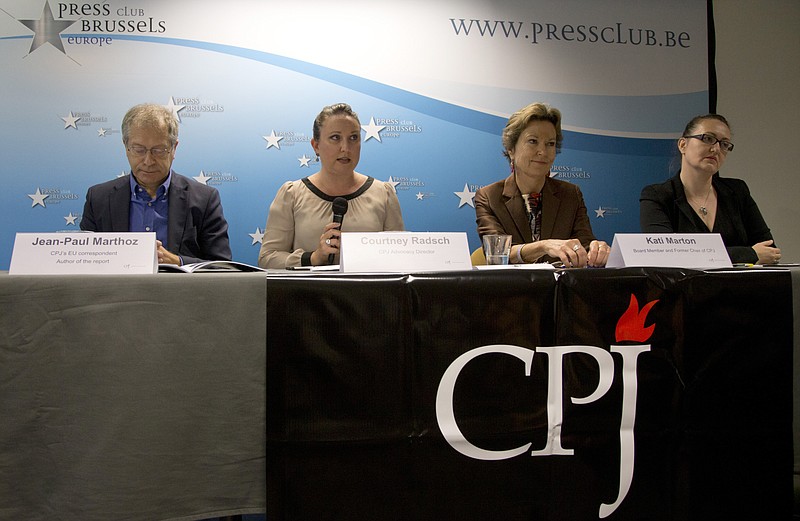BRUSSELS (AP) - An international press freedom group says the European Union has been too lenient in its treatment of media abuses in Hungary and accuses it of economic bias in defending the rights of journalists.
The New York-based Committee to Protect Journalists said in Tuesday's report "Balancing Act" that the 28-nation bloc was struggling to match its lofty human rights standards with its day-to-day actions in protecting journalists around the world.
"There are significant challenges that undermine press freedom and new threats are emerging," the report concluded.
Hungary has come under intense scrutiny since Prime Minister Viktor Orban came to power and professed he wanted to turn Hungary into an "illiberal state" like Russia and China, where press freedoms are also under intense pressure.
Even though EU institutions including its legislature have criticized Orban, firm action has yet to be pushed through.
"By not holding member states to account, the EU has failed to forcefully and consistently defend press freedom," the CPJ said.
Under Orban, "the state media have been turned into pro-government mouthpieces, state advertising has been used to reward friends and punish dissenters, independent journalists have been marginalized, and limits have been imposed on its Freedom of Information Act law," the report said.
There also have been incidents during the migrant crisis in Hungary earlier this month. The Associated Press has protested the brief detention of one of its journalists by police as he covered migrants crossing the border, saying he was forced to delete footage that included images of a police dog knocking down a refugee. Hungary has disputed the account.
Hungarian government spokesman Zoltan Kovacs said he had no comment on the CPJ report.
The European Commission says that member countries are responsible for regulating the media and that there is very little the EU can do in this area.
"It is not the commission which can intervene with regards to media legislation, tackling media independence, guaranteeing media independence, but politically of course we do whatever we can to promote media freedom," spokeswoman Mina Andreeva said.
The report's author, Jean-Paul Marthoz, acknowledged that the EU has been more vocal about Hungary recently, but he said the bloc "has been too lenient on its member state, allowing it to raise stakes and violate the EU's most fundamental values at the risk of destabilizing much more than the eurozone crisis, the whole EU process."
CPJ board member Kati Marton warned that "Orban's Hungary is a captive nation because a nation is captive if there is no free press. If it has only one voice and if there is only one voice, then the people really have no sense of what is going on in the rest of the world and that leaves room for demagogues to manipulate public opinion."
Though the member nations still control much decision-making on press freedom, the CPJ also said the EU should do more by enforcing rules on public broadcasting, the digital agenda and rights issues. And it said the EU should be more even-handed in criticizing outside nations.
"The EU is inconsistent," the report said. "This approach allows for situations where a country such as Burundi, with little strategic value, can be more severely reprimanded for its actions than China."
___
Pablo Gorondi in Budapest and Lorne Cook in Brussels contributed to this report.
